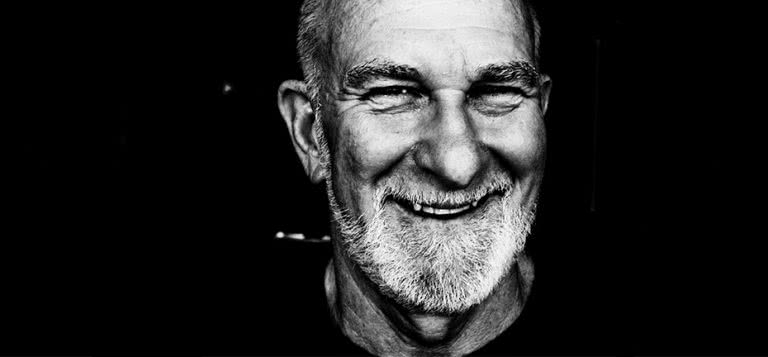Warren Fahey has one of the most varied job descriptions you can imagine.
Author, broadcaster, songwriter, artist, folklore collector and “recycling unit”, music publisher, roustabout. It ensures he never runs out of conversation topics at dinner parties, but more pertinently, it has seen him amble across the great sweep of Australia for over 50 years amassing a wealth of the stories that shape who we are.
Fahey is returning to Sydney Festival with 40 Ways To Love Your City, having featured at the festival’s debut 40 years ago. It’s a little like coming home, though after all this time, no-one is still really sure what to call him.
“People kept trying to put a tag on me,” Fahey explains with a wry chuckle. “I really must confuse the immigration department, every time I came in and out of the country. They look at me, and sometimes I’ll say I’m a cultural historian, because that encompasses the ‘thing’ I do in history, music, performance – all my projects I do under the banner of ‘cultural historian’, but it’s evolved. I’ve been doing this for 50-odd years nearly, and I do have a unique situation. Largely because I work for myself, I tended to knock doors down rather than knock politely, and that’s the only way you survive.”
You suspect a folklorist would have an appreciation for Australian character like few others, be that the classic larrikin Aussie, the bushranger, the shearer, the sportsperson. With the Cronulla riots decennial having recently passed – and with the dire rhetoric many media sources are now pushing – Fahey has found himself as a particularly vital witness. With such blunt patriotism at large, such discrimination, fear and apathy mixed in with the decent and hopeful, you can’t help but ponder the path Australia is travelling.
“I think Australia is growing up,” Fahey says. “I also think we have a lot of hiccups in the road. I’m old enough to have seen the migration waves after World War II, and saw Maltese kids and Italians coming to our schools, and I learned very quickly that if I swapped my peanut butter and lettuce sandwiches with their cheese and salami, I got the best deal. I believe that multicultural Australia is a reality, it’s who we are. But my job is to tap people on the shoulder and remind them of the great debt that we all owe – doesn’t matter if your family came out on the First Fleet or on a leaky boat last week – to remind them of the nuts and bolts of how this country grew up. A lot of that was our survival against the odds living on the land in the 19th century. Most Australians lived in the bush then, and it contributed to who we are, to our language, to our slanguage, how we dressed, our sense of humour.
“Really, we live in a changing world that’s unfortunately very affected by a very dumbed-down media in most cases. As a small nation, we have to be quite diligent in remembering we’re not just a state of America or part of the UN. We have ties to all these countries, Asia in particular. But we have a very unique culture. And sure, it’s going to change. Sure, it has to reflect our multiculturalism. But we have to save all those things that make us individual, especially things like our humour. You can lose it when there’s a ratbag or extreme element. I think anything extreme is going to be dangerous.”
Fahey’s three Sydney Festival appearances will necessarily cover a wide range of suburbs and ethnicities, as he endeavours to identify just who and what comprises the Harbour City. From littleknown tidbits of the festival itself, to the more esoteric aspects of Sydney’s history, Fahey hopes to entertain as much as he might educate.
“They realised I was there at the very first Sydney Festival in 1977, and had put on a series of concerts. So here am I, in 2016, as a bookend for 40 years. I talk about Hashfield, Vietnamatta, Parra-doesn’tmatta, the North Snore, all those things. I’m going to take a bit of the piss, because we enjoy it, but also because it gives us a level playing field. We’re all different, we’re all the same. We’re all Sydneysiders.”
Fahey remains, as ever, entirely optimistic about where our sunburnt country is heading. If we are indeed moving to calmer waters, it is in no small way thanks to people like Fahey, reminding us of the labyrinth narrative of our past.
“Folklore is a device that we use to signify our individuality as a community and as a nation. I keep coming back to humour, because I’m a great believer that you can throw all the facts and figures in the world at somebody, but if you can make them laugh and understand why we’re different, you can achieve quite a lot. Take for example the Asian immigration into Australia. There are so many stories about that, a lot of it’s not very pretty, but these days we know the Asian percentage of our population has been a terrific contributor to who we are as Australia today.
“But those stories, even the ugly ones, have to stand side by side with the success stories. One of my jobs is to make people think a little bit more about who we are, where we come from and where we’re going.”
Warren Fahey will be at The Famous Spiegeltent on Saturday January 23 and Sunday January 24 as part of Sydney Festival 2016.

































